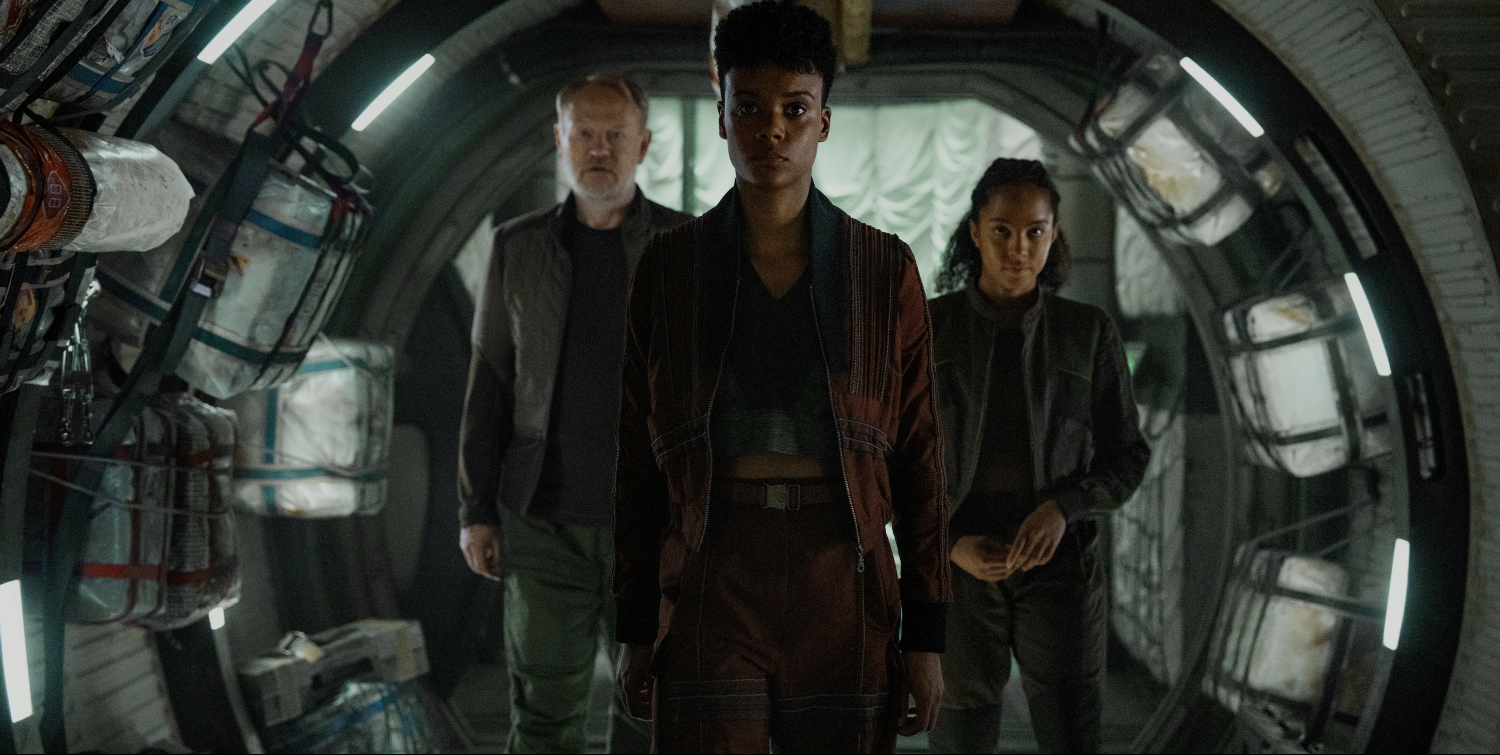Foundation
[TV]
Saison/Season 2
2023

FR EN
Cet été, Apple TV nous transportait à nouveau dans l’univers d’Isaac Asimov avec la seconde saison de la série créée par David S. Goyer (The Dark Knight) et Josh Friedman (La Guerre des Mondes). Le Cycle d’Asimov étant particulièrement difficile à adapter de par ses sauts temporels, son absence de protagonistes, et ses différentes thématiques abordées lors de parenthèses narratives, la première saison réussissait néanmoins à construire un récit cohérent et captivant, en faisant des compromis, et en choisissant Gaal comme personnage principal de cette partie d’échecs entre Hari Seldon et l’Empire s’étalant sur un millénaire. Si cette seconde saison nous ouvre encore un peu plus les portes d’un univers immensément riche, elle dévie déjà largement des écrits de l’auteur américain et s’avère moins intrigante que son premier volet.
“All empires fall”
L’on retrouve pourtant les qualités de la première saison avec de magnifiques visuels (même s’il y en a moins), des décors variés et travaillés, et bien sûr de larges thématiques développées en profondeur dans un récit qui prend son temps. Le rythme reste donc lent et les relations entre les personnages peu émouvantes dans la mesure où la série s’attaque à des enjeux galactiques et historiques à grande échelle, au sort des sociétés plus qu’à ceux des individus. C’est un conte à la gloire de la science qui célèbre la puissance des idées progressistes face à l’oppression des puissants cyclisés. Elle aborde aussi bien les questions de robotiques que les modèles prédictifs, le tout dans un récit messianique où la science devient une religion, et le professeur un prophète. C’est une Église du Scientisme qu’affronte idéologiquement l’Empire alors que sa stabilité assurée par son triumvirat de clones Empereurs s’effrite.
Cette seconde saison s’avère donc moins captivante, moins dense et moins complexe que la première. Le voile de mystère qui entourait la chronologie non-linéaire et le world-building de la première n’est plus aussi marqué du fait d’une narration fragmentée en trois arcs distincts qui ne se rejoignent pas, et de la quasi-disparition de la narration intemporelle de Gaal qui reliait le tout. Dans l’ensemble, la saison deux est donc moins impressionnante que la première, même si les enjeux et les rebondissements s’accentuent dans sa deuxième moitié.
“Hope is painful”
Il apparaît difficile de raconter la fin d’une époque en se concentrant sur des destinées individuelles mais la série réussit néanmoins à le faire à travers notamment la manière dont l’Empire se craquelle, gangréné par des sentiments bien humains. Car le poids des sentiments, et plus généralement des décisions individuelles pèse peu dans l’histoire des civilisations. Le cœur humain n’a en effet que rarement d’importance dans l’Histoire du temps, mais le futur est pourtant (ré)inventé chaque seconde par une somme de décisions individuelles. Le poids de l’individualité sur le futur d’une société est donc questionné et mis en scène, ainsi que la question de la postérité dans la mesure où chaque personnage – aussi bien psychohistoriens qu’impériaux – lutte contre le poids de l’Histoire. Cette seconde saison adopte également un récit très biblique dans son parallèle paradoxal entre religion et science dans une opposition entre croyance et foi et un flou entre culte et technologie, et poursuit son jeu de pouvoir en interne avec un véritable coup d’État déguisé.
« Foundation » poursuit donc son épopée SF mêlant prophétie et géopolitique dans une adaptation assez libre des écrits originaux mais qui reste cohérente et convaincante. Bien que cette seconde saison soit moins spectaculaire, la série produite par Skydance reste un bon thriller galactique au potentiel encore infini.
This summer, Apple TV once again brought us back to Isaac Asimov’s universe with the second season of the series created by David S. Goyer (The Dark Knight) and Josh Friedman (War of the Worlds). The Foundation series is particularly challenging to adapt, with its time jumps, lack of a protagonist and various thematic interludes, but the first season nevertheless managed to build a coherent and captivating narrative, making compromises and choosing Gaal as the main character in this chess game between Hari Seldon and the Empire spanning over a millennium. While this second season opens even further the doors to an immensely rich universe, it already deviates significantly from the American author’s books, and proves less fascinating than the first.
“All empires fall”
Yet the qualities of the first season are still there, with wonderful visuals (although there are fewer of them), diverse and well-crafted settings, and of course broad themes developed in depth in a narrative that takes its time. As a result, the pace remains slow and the relationships between the characters little moving, as the series tackles large-scale galactic and historical issues, dealing more with the fate of societies than that of individuals. It’s a myth in the glory of science, celebrating the power of progressive ideas in the face of the oppression of the cyclical rulers. It tackles issues ranging from robotics to predictive models, all in a messianic tale where science becomes a religion, and the professor a prophet. It’s a Church of Scientism that the Empire is ideologically up against, as its stability assured by its triumvirate of clone Emperors erodes.
This second season proves less captivating, less dense and less complex than the first. The veil of mystery that surrounded the non-linear chronology and the world-building of the first is no longer as striking, due to a narrative fragmented into three distinct arcs that don’t come together, and the near-disappearance of Gaal’s timeless narration that tied it all together. Overall, then, season two is less impressive than the first, even though the stakes and twists get higher in its second half.
“Hope is painful”
While it may seem hard to tell the story of the end of an era by focusing on individual fates, the series nevertheless succeeds in doing so, especially through its depiction of a shattered Empire consumed by human feelings. After all, the power of feelings, and more generally of individual decisions, carries little weight in the history of civilization. The human heart indeed rarely matters in the history of time, yet the future is (re)invented every second by a sum of individual decisions. The weight of individuality on the future of a society is thus questioned and staged, as well as the issue of posterity insofar as each character – whether psychohistorian or imperial – fights against the burden of History. This second season also takes on a very biblical narrative in its paradoxical parallel between religion and science in an opposition between belief and faith and a blurring between worship and technology, and continues its internal power play with a real disguised coup.
“Foundation” thus continues its sci-fi epic combining prophecy and geopolitics in a rather loose adaptation of the original books, but one that remains consistent and engaging. Although this second season is less spectacular, the series produced by Skydance remains a good galactic thriller with still infinite potential.

